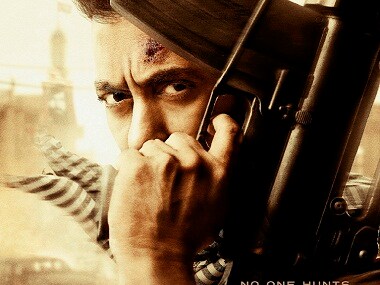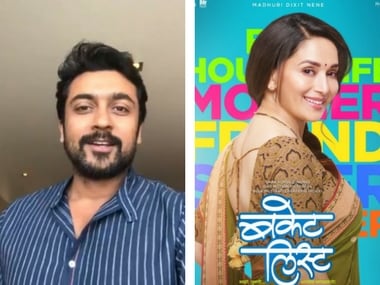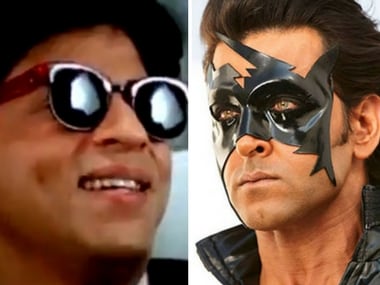From Dabangg to Tiger Zinda Hai, how Salman Khan rules the box office one mega hit after another
With Tiger Zinda Hai raking in excess of Rs 300 crore and still running strong, this is the 11th time in his 29-year-old career that Salman Khan has given the top hit of Bollywood beating all competition hollow. Even if we take out his extended special appearance in Kuch Kuch Hota Hai (1998), that still leaves him with 10 top grossers of the year in 29 years. This is more than one third of all top grossers since he entered Bollywood.
Maine Pyar Kiya, Saajan, Hum Aapke Hain Koun, Kuch Kuch Hota Hai, Hum Saath Saath Hain, No Entry, Dabangg, Bodyguard, Ek Tha Tiger, Bajrangi Bhaijaan and Tiger Zinda Hai — all these were the most watched films of the year. No actor of his generation has the same kind of fan following. No one in Bollywood history has ever enjoyed this kind of popularity. Yes, Dilip kumar, too, had 10 top hits of the year but those were spread over 42 years. Megastars like Amitabh Bachchan and Shah Rukh Khan have five each. While an Aamir Khan has seven, five of which came in the last decade only. That explains the immense longevity of Salman’s popularity. What is it that makes Salman different from his contemporaries?
Let us go where it all started. Though son of one of the biggest screen writers, Salim Khan, Salman’s growing up years and his journey in films began during the bad phase of his father after he and Javed Akhtar had separated as writers (Salim-Javed was the finest writing duo the industry has known) and Salim Khan was mostly out of work.
Salman never got a big launch like his contemporaries Aamir Khan of the Nasir Hussain family, who was launched with Qayamat Se Qayamat Tak, or even ‘outsiders’ like Shah Rukh and Akshay Kumar, who started out in strong central characters in Deewana and Saugandh respectively. Salman, by contrast, started with a side role in a small family drama, Biwi Ho To Aisi, in 1988, in which he played the agile devar (brother-in-law) to Rekha.
It was Salman’s second film, Sooraj Barjatya’s Maine Pyar Kiya, that did the trick for him for which he had to audition alongside the likes of Aditya Pancholi, Rahul Roy and Mamik among few others. The film went on to become an all time blockbuster running for two years, reportedly breaking Sholay’s record and became the biggest hit of the decade of '80s. Soon, girls got their new poster boy who bared his chest and believed in 'dosti mein no sorry, no thank you'.
And then what happened? Well, all the credit went to the film’s heroine, Bhagyashree, and Salman got offered only small films like Baaghi, Sanam Bewafa and Kurbaan. Interestingly, all these films became box office hits with Saajan (1991) being his second top hit of the year within three years of his launch. But once again, the media gave credit for the film’s success to Madhuri Dixit and Sanjay Dutt.
Next followed a real bad phase where his films started flopping one after the other. Obituaries were already being written for the career of somebody four years into the business with five hits in his kitty in that period. One magazine went to the extent of saying that Salman was like the Rajesh Khanna phenomenon who after a brief period of glory, never managed to resurrect his career.
And then came Salman’s biggest hit — Hum Aapke Hain Koun in 1994. It beat all the previous records by 500 per cent and became the top hit of the '90s decade. The film went down in history as a blockbuster not only in India but also worldwide. And Salman truly became the eternal Prem. Every Karol Bagh wedding had the boys dressed in mustard colour Hum Aapke Hain Koun suits, every college girl was in love with him and every mom wanted a son-in-law like him. But once again, media attributed the success to the film’s leading lady, Madhuri Dixit.
Thereafter started a steady stream of hits for the next five years, during which period Salman maintained a huge distance from the media refusing to give interviews or entering into any barter deal with award night organisers to perform free in lieu of an award, rubbing many a publications a wrong way. He had his prize for dancing on stage for even the biggest award in the country and did not care two hoots for their trophies.
Hits after hits followed — Karan Arjun, Jeet, Judwaa, Pyar Kiya To Darna Kya, Jab Pyaar Kisise Hota Hai, Bandhan, Kuch Kuch Hota Hai, Hum Saath Saath Hain, Biwi No 1 and Hum Dil De Chuke Sanam. By the end of 1999, Salman had accumulated the maximum number of hits in his name amongst all his contemporaries — a total of 13 hits in his career till then.
Next year, a few of his films flopped though he had average success in Dulhan Hum Le Jayenge and Har Dil Jo Pyar Karega. Next year, yet again, he was seen in an average film, Chori Chori Chupke Chupke. So did the following year in Hum Tumhare Hain Sanam. Rest of his films failed and barely on the basis of three years of under performance, the media decided to write him off yet again, for the third time in less than 15 years.
But the superstar was made of sterner stuff. Tere Naam in 2003 ended the drought of hits for Salman. Tere Naam also has a cult following for the actor's performance and haircut in the film. This was followed by Baghban. His special appearance in Baghban brought initial footfall to theatres though Amitabh Bachchan was in the central role. Again hits started trickling in. Mujhse Shaadi Karogi,Maine Pyaar Kyun Kiya, No Entry, Partner and Wanted ensured that Salman remained in business, and at the top of his game.
And then the biggest turnaround happened. What was responsible for it, no one knows. Did Salman suddenly turn a new leaf? Did the penetration of multiplexes in smaller cities and towns mean that his hoi-polloi fan following was suddenly paying higher average ticket price (though the footfalls of his movies were always the highest, revenues were less as his films mostly worked better in low-end cinemas and mofussil areas) or burst of social media ensured that people had a voice – and louder than the mainstream media. Fan clubs, fan pages, fan groups of Salman mushroomed online, fighting with fans of other stars to claim Salman’s supremacy even as hits were raining like never before.
Dabangg, Ready, Bodyguard, Ek Tha Tiger, Dabangg 2, Kick, Bajrangi Bhaijaan, Prem Ratan Dhan Payo, Sultan and Tiger Zinda Hai have, in the last eight years, ensured the kind of records that will be impossible for another actor to beat in the coming years. Can you imagine the whole of this decade Salman has had just two under performers — Jai Ho and TubeLight — and both have done almost similar business than the highest grossers of most of his contemporaries.
A certain section of baffled media swoops down on every Salman film usually twice a year, tearing it apart, trashing his performance while calling it just a shirtless show, with rare exceptions (Bajrangi Bhaijaan and Sultan). And yet, crores of people throng the theatres to watch his films usually within the first two to three weeks making his film’s recovery the fastest in the business.
No film industry in the world has seen a phenomenon like this ever. An actor, 29 years into the business, at the top of the box office game, owning almost every record in his name and showing no signs of slowing down anytime soon. That, for you, is the unstoppable phenomenon called Salman Khan.
Published Date: Jan 14, 2018 14:45 PM | Updated Date: Jan 14, 2018 18:20 PM












